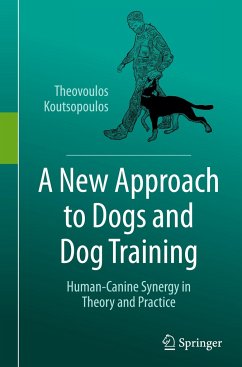This book presents a new and innovative concept in dealing with dogs: the human-canine synergy (HCS), characterized by a holistic nature and its differentiation from unidimensional terms expressing the affiliation of humans and dogs (Relationship, Interaction, Bonding). Related to the use and training by humans, it applies three main categories of dogs: a) the empathy/therapeutic individuals, which are dogs helping persons with empathy- or therapeutic needs; b) assisting/working dogs carrying out specific actions to aid or assist humans perform specific tasks; and c) the facilitating/inspiring dogs, which enable or improve various human activities, including classroom dogs for teaching and learning purposes in almost all educational subjects.
Organized in three parts, chapters address the following needs:
-The first section illuminates the concept of HCS as well as basic principles determining this synergy and consequently the process of training dogs (owners and professional trainers). Readers will understand the role of a dog's personality, behavior and especially temperament in its successful training.
-In a scientifically documented way, the second part guides those who wish to engage in dog training (amateur or professional). It describes basic training forms within the HCS framework (obedience, protection, detection and classroom dog) and necessary steps for proper completion.
-The third book part describes the business of dog training with multi-dimensional approach by emphasizing a good understanding and knowledge of interactions and the environment in which trainer, owner and dog typically operate.
Overall, this work is a valuable read for anyone who deals with our four-legged companions for business or pleasure.
Hinweis: Dieser Artikel kann nur an eine deutsche Lieferadresse ausgeliefert werden.
Organized in three parts, chapters address the following needs:
-The first section illuminates the concept of HCS as well as basic principles determining this synergy and consequently the process of training dogs (owners and professional trainers). Readers will understand the role of a dog's personality, behavior and especially temperament in its successful training.
-In a scientifically documented way, the second part guides those who wish to engage in dog training (amateur or professional). It describes basic training forms within the HCS framework (obedience, protection, detection and classroom dog) and necessary steps for proper completion.
-The third book part describes the business of dog training with multi-dimensional approach by emphasizing a good understanding and knowledge of interactions and the environment in which trainer, owner and dog typically operate.
Overall, this work is a valuable read for anyone who deals with our four-legged companions for business or pleasure.
Hinweis: Dieser Artikel kann nur an eine deutsche Lieferadresse ausgeliefert werden.








